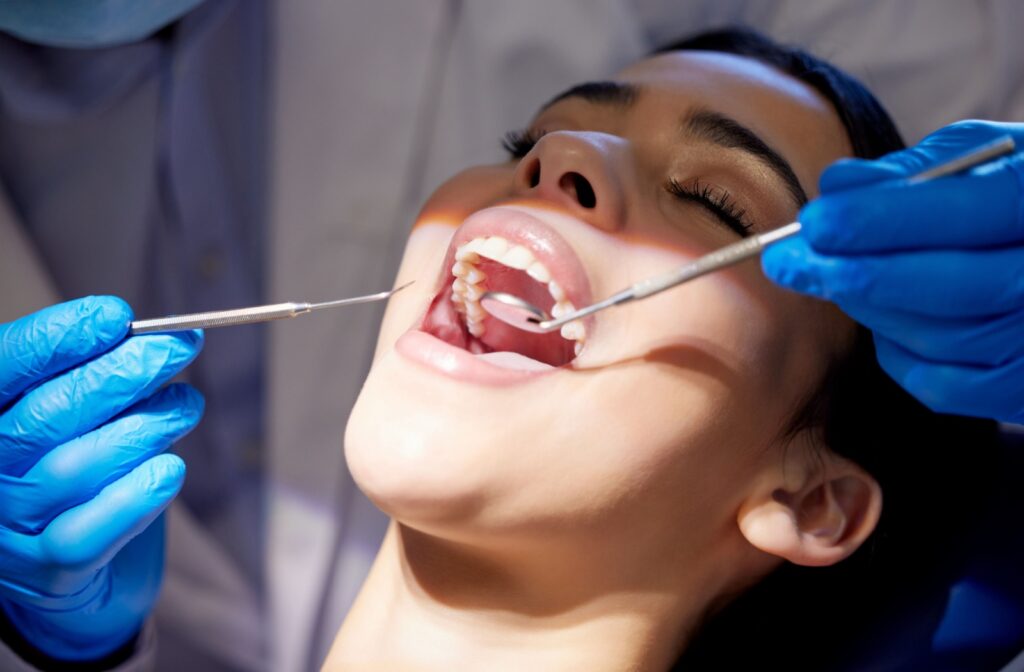Dental cleanings are an essential part of maintaining your oral health. They do more than just leave you with a brighter smile—they help prevent cavities, gum disease, and other serious dental issues.
If you’ve been wondering about what happens during a cleaning, knowing what to expect can help you feel at ease before your visit. Most dental cleanings take about 60 to 90 minutes, though the exact time depends on your oral health, the type of cleaning needed, and whether additional steps like X-rays are included.
What Is a Dental Cleaning?
A dental cleaning is a professional procedure performed by a dental hygienist (and sometimes your dentist) to remove plaque and tartar that can’t be addressed by brushing and flossing alone. These cleanings help keep your teeth, gums, and overall oral health in top condition. Regular cleanings are vital because plaque and tartar harbour harmful bacteria that can lead to decay and gum disease if left untreated.
How Long Does a Typical Dental Cleaning Take?
On average, a dental cleaning lasts about an hour, but the time can vary depending on the type of cleaning:
- Routine Cleaning: If you’ve been keeping up with good oral hygiene and regular dental visits, your cleaning will usually be straightforward and may take closer to 60 minutes.
- Deep Cleaning (Scaling and Root Planing): If gum disease is present, a deep cleaning may be required. These appointments are more time-intensive, lasting 60 to 120 minutes, and sometimes need multiple visits.
- Children’s Cleanings: Because children generally have less buildup and smaller mouths, their appointments are often shorter, usually under an hour.
Before your cleaning begins, your dental team will assess your teeth and gums to determine which type of cleaning you need.
What to Expect During a Professional Dental Cleaning
Understanding the process can make the appointment feel more predictable and less stressful. A standard cleaning usually includes the following steps:
Initial Exam (5–10 Minutes)
The hygienist begins with a quick check of your teeth and gums using a small mirror. They’ll look for signs of inflammation, buildup, or other concerns. If a more serious issue is spotted, your dentist may step in for a closer look before the cleaning proceeds.
Scaling & Removing Tartar (20–50 Minutes)
Scaling is often the longest part of the cleaning. Your hygienist will carefully remove plaque and tartar using special tools. In cases of heavy buildup, ultrasonic instruments may be used to make the process more efficient.
Teeth Polishing (5–10 Minutes)
After scaling, your teeth are polished with a high-powered toothbrush and gritty paste. This smooths the tooth surfaces, making it harder for plaque to build up in the future.
Flossing (5 Minutes)
Your hygienist will floss between every tooth, ensuring no plaque or debris is left behind. This step also helps them identify any sensitive areas or bleeding gums that might need extra care.
Fluoride Treatment (1–5 Minutes)
Many cleanings finish with a fluoride treatment to strengthen your enamel and protect against cavities. This can be applied as a gel, foam, or rinse, and takes only a few minutes.
Final Checkup & Discussion (5–10 Minutes)
To wrap up, your dentist may review the results of the cleaning, address any concerns, and answer your questions. You’ll also receive recommendations for at-home care and when to return for your next cleaning.
Factors That Influence the Length of a Dental Cleaning
While most appointments fit comfortably into a one-hour window, several factors can make your cleaning shorter or longer:
Tartar & Plaque Buildup
If you’ve missed a few cleanings or don’t brush and floss regularly, you may have more tartar buildup. This can extend the scaling portion of the appointment.
Oral Health Conditions
Issues like gum disease, cavities, or inflammation can add extra time, as your dentist may need to provide additional care or recommend follow-up treatments.
Frequency of Dental Visits
Patients who come in regularly often have shorter, easier cleanings compared to those who delay visits. Skipping appointments allows tartar to harden and spread, making removal more time-consuming.
X-Rays or Additional Procedures
If your dentist needs X-rays to get a closer look at your oral health, this can add time to your visit. Other procedures—such as addressing sensitivity, repairing fillings, or discussing treatment plans—can also lengthen the appointment.

Tips for a Smooth & Efficient Dental Cleaning
A little preparation can go a long way in making your cleaning easier and more comfortable:
- Brush and floss daily to minimize tartar buildup.
- Stick with your regular cleaning schedule (usually every six months).
- Let your dentist know if you experience dental anxiety or sensitivity so they can adjust your care.
- Arrive a few minutes early to relax and complete any paperwork without feeling rushed.
These small steps help ensure your cleaning is as quick and stress-free as possible.
Why Regular Cleanings Matter
Beyond fresh breath and a polished smile, dental cleanings play a big role in your overall health. They help prevent cavities, gum disease, and infections, and they also allow your dentist to catch potential issues early—before they become painful or costly to treat. Consistent care can even reduce the risk of systemic health concerns linked to oral bacteria, such as heart disease and diabetes.
Schedule Your Next Dental Cleaning in Toronto
Dental cleanings don’t just keep your smile looking great—they protect your long-term oral and overall health. Most cleanings last about an hour, but this time is well worth it for the benefits provided. If it’s been a while since your last appointment, now is the perfect time to get back on track.
At Dentistry on Danforth in Toronto, ON, our team provides thorough, compassionate dental care tailored to your needs. Whether you’re due for a routine cleaning or need extra support, we’re here to make the process comfortable and effective. Contact us today to schedule your next cleaning and take the first step toward a healthier smile.


